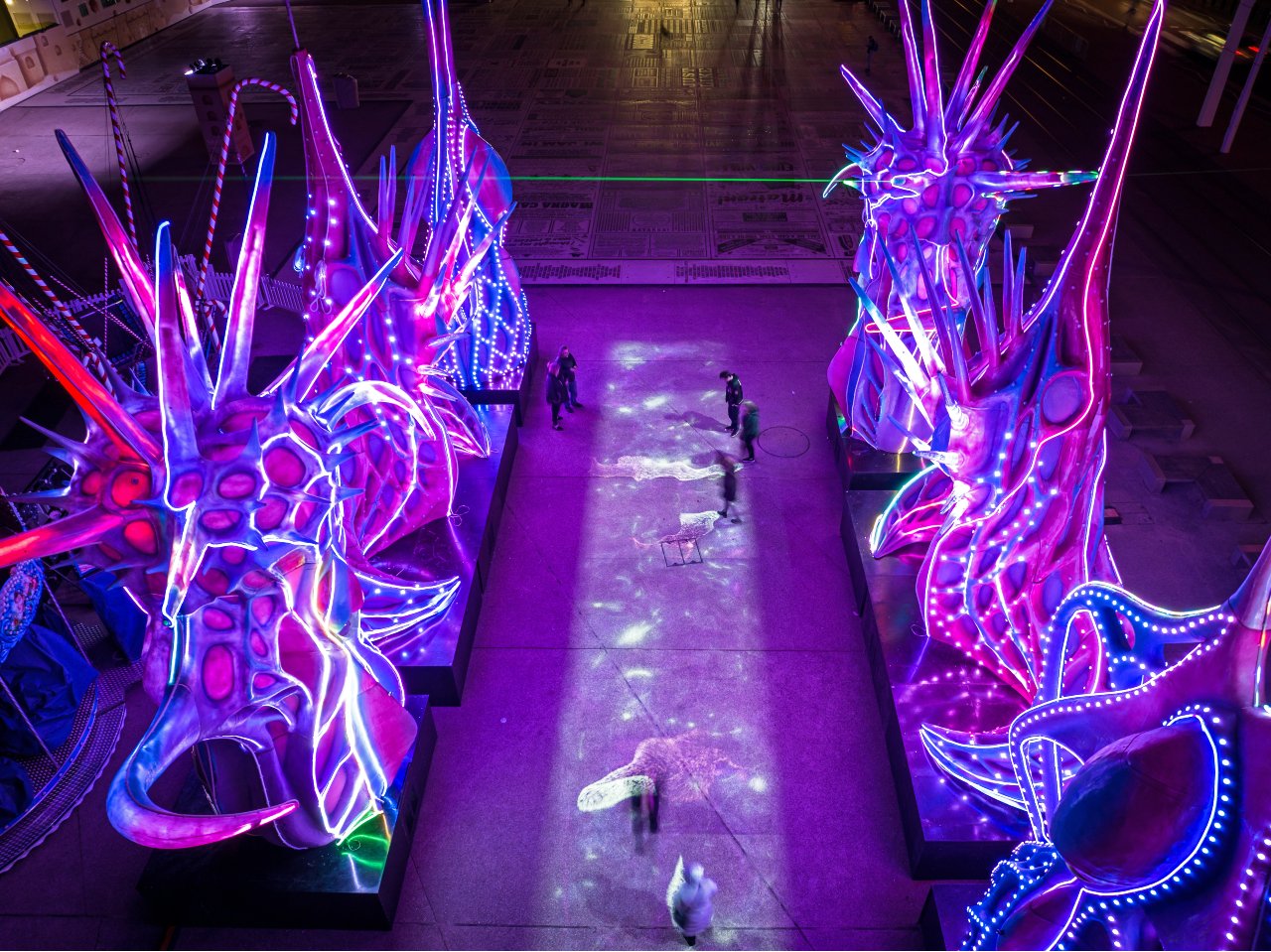Lancaster computer scientists help bring a space-age look to Blackpool’s Golden Mile
 © Visit Blackpool
© Visit Blackpool
A team of Lancaster University computer scientists have helped to create the biggest standalone light installation ever developed for Blackpool Illuminations bringing a futuristic feel to the famous Golden Mile.
Standing at 11 metres high, Odyssey is a spectacular interactive display that has been co-created by international designer Jack Irving in collaboration with researchers from Lancaster University’s School of Computing and Communications.
The outdoor installation, situated on the Promenade opposite the Blackpool Tower, comprises six large-scale towers that are combined with state-of-the-art technology to create an immersive projection show themed on undiscovered creatures lurking in the depths of the deep sea.
The towers have been in place throughout this year’s Illuminations and there are now a few weeks left to see, and interact, with the Odyssey installation, as it remains in its prominent position over Half Term until Sunday, February 26. It will then return as next year’s Blackpool Illuminations.
Odyssey, which has been manufactured at the Blackpool Illuminations Lightworks factory, has taken more than two years to design and build.
The design of the towers is based on sea gods from Greek mythology: Poseidon, Aphrodite, and Amphitrite. Aphrodite, the tallest of the towers, is an impressive 7 metres wide, and 11 metres high.
The installation provides an extraordinary interactive experience for visitors as they discover alien sea creatures swimming and swirling around their feet.
Through advanced technology developed by the Lancaster research team, no two experiences are the same as the projector maps individual movements of visitors and reflects back a customised projection, creating a unique and interactive encounter for each person. The Odyssey towers incorporate 60 powerful lasers and a dramatic sound and light show.
The team of computer scientists at Lancaster University have provided the technological expertise required for this mammoth project, adding a level of interacivity that has never been seen before in the Blackpool Illuminations display.
Joe Finney, Professor of Computer Science and who led the Lancaster University research team, said: “It is wonderful to see the installation in place and looking fantastic on Blackpool’s Promenade and to see all the visitors enjoying interacting with the projections.
“We are thrilled to have worked with the Blackpool Illuminations team and Jack Irving in creating Odyssey. Lancaster University is committed to engaging actively with our partners as a force for societal good at regional, national and international levels. Through Odyssey, the most technologically advanced art installation ever deployed by Blackpool Illuminations, we aim to instil a new paradigm of interactivity into the illuminations, allowing visitors to not only see the lights, but to feel a part of it.”
Five futuristic facts about Odyssey:
· There are over 10,000 lines of code for the interactive elements of Odyssey
· In excess of 2,500 hours have been spent on developing the code, simulation and testing
· Each tower contains a Panasonic 20k projector, a raspberry Pi and camera
· Over 32 tonnes of steel has been used for the skeleton of the towers
· 2,400 LED nodes and over 3,500 metres of LED lighting has been used in the display
The creation of Odyssey has been assisted by the investment that Blackpool Council has received from the Towns Fund, which is aimed at rejuvenating the Illuminations and developing new concepts that will attract new generations of visitors.
Professor Finney's team includes Lorraine Underwood, a PhD Student in Computer Science; Dr Miriam Sturdee, a Research Fellow, Kobi Hartley, a PhD student in Computer Science, and Sam Nugent, a third year Computer Science Student.
Mrs. Lorraine Underwood said: “It was a dream come true to work on such a big project within Blackpool Illuminations. I feel immense satisfaction to know that my code is creating interactions for people to enjoy on the promenade.”
Mr Nugent said: "Working on Odyssey was such an amazing opportunity, and I am so thankful to the School of Computing and Communications and Blackpool Illuminations for inviting me to join. This was a once in a lifetime opportunity which put me out of my comfort zone and gave me such unique experience. I couldn't truly understand the scale of this project until it all came together."

Credit: Visit Blackpool
Back to News
